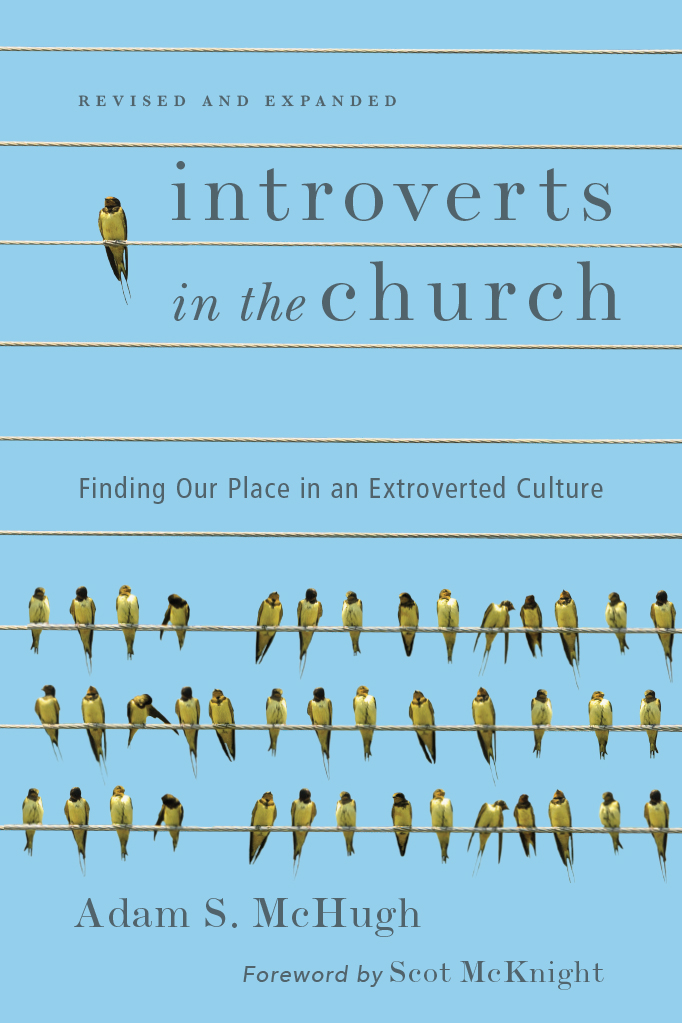Adam McHugh: Introverts in the Church
 Adam S. McHugh, Introverts in the Church: Finding Our Place in an Extroverted Culture, Revised and Expanded (Downers Grove, IL: InterVarsity Press, 2017), 240 pages, ISBN 9780830843916
Adam S. McHugh, Introverts in the Church: Finding Our Place in an Extroverted Culture, Revised and Expanded (Downers Grove, IL: InterVarsity Press, 2017), 240 pages, ISBN 9780830843916
Introverts in the Church was first released in 2009. The book caught my eye back then because I am an introvert. I reviewed the first edition of the book for Gordon-Conwell Theological Seminary’s Africanus Journal. The author, Adam McHugh, is a Presbyterian minister and a self-confessed introvert. He knows from observation, study, and perhaps most importantly personal experience, how people perceive and react to introverts. He thus writes as an “insider;” he is well aware of the tendencies, challenges, strengths, and weaknesses of introverts.
In the foreword, Scot McKnight sets the stage for some of the material discussed in the book. He gives a couple of examples of church practices that can make introverts uncomfortable. He refers to the “passing of the peace” (a sort of “greet your neighbor” moment) and standing, raising our arms, and singing in the worship service. He says that introverts probably did not initiate these practices in church life. It may be news to some parishioners that these practices can make introverts uncomfortable.
McHugh has a good sense of humor. The reader becomes aware of this in the preface of the book when he mentions a number of the working titles he played with for the book, the titles are “Introverts in the Hands of an Extroverted God,” “Girl Meets Introvert, Keeps Looking,” and “Left Behind, and Happy About It.” All of these titles hint at the idea that introverts are to some degree either unimpressive or unusual. In an extroverted world they seem “different.” In reality many people, including introverts, see introverts in this way.
Most people are a blend of both extroverted and introverted qualities; however, usually one of them is more dominant. In the course of the book McHugh highlights some of characteristics of introverts. For example, introverts are energized by quiet, by being in solitude with little or no interaction with other people. Introverts also process things internally. Calling attention to the differences between introverts and extroverts in this regard McHugh writes “extroverts speak in order to think, whereas introverts think in order to speak” (page 42). In addition, introverts tend to have fewer, but deeper friendships and fewer and more focused interests. Because of these traits introverts are sometimes perceived to be self-focused or narcissistic. In chapter 5, the author offers some suggestions to help introverts reach out to connect with others.
McHugh affirms that God made some people to be introverts that they have value and have much to offer to the church. One thing that introverts offer to the church is a “longing for depth” (page 76). Some of their other commendable qualities are: creativity, loyalty, service, and the fact that they generally have a calm disposition. In fact, with regard to service they tend to like ministries that are done behind the scenes. That being said, McHugh writes that introverts can also be involved in ministries that one might typically expect to be done by extroverts. He maintains that introverts can do evangelism and be involved in leadership in the church. With reference to evangelism he offers suggestions of ways that introverts can evangelize that are more in harmony with their personality.
After reading this book those of us who are part of the Pentecostal/charismatic church may wish to reflect on how we do church. Do any of our practices make introverts uncomfortable or alienate them? I am not here suggesting that everything be changed to accommodate one part of the church. Rather, armed with the information in this book we might ask ourselves if we could be a bit more sensitive to the introverts in our midst.
Introverts in the Church is a very valuable resource which I hope will enjoy a wide readership in the church, especially by church leaders. It is rich with insights about the quieter members of the church. The book will help extroverts better understand introverts and may give introverts a better understanding of themselves. I wish that I had known about the differences between introverts and extroverts years ago. Introverts and extroverts need one another and McHugh urges them to work together to bring their various strengths into the service of Christ. This is in harmony with what the apostle Paul wrote so many years ago in 1 Corinthians 12 about the variously gifted members of the body (the church) needing one another.
Reviewed by John P. Lathrop
Publisher’s page: https://www.ivpress.com/introverts-in-the-church


